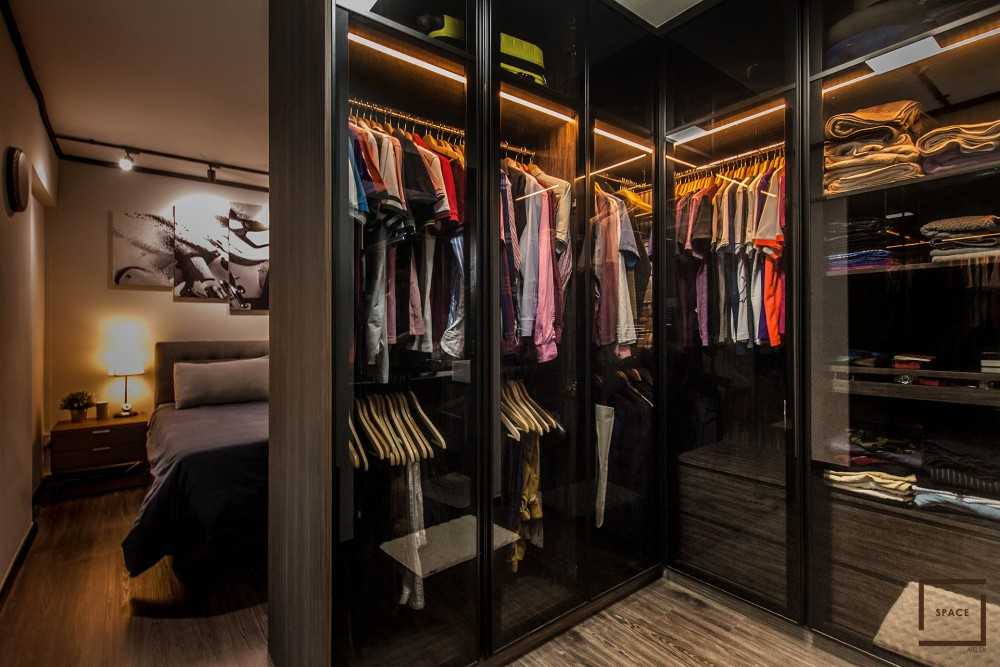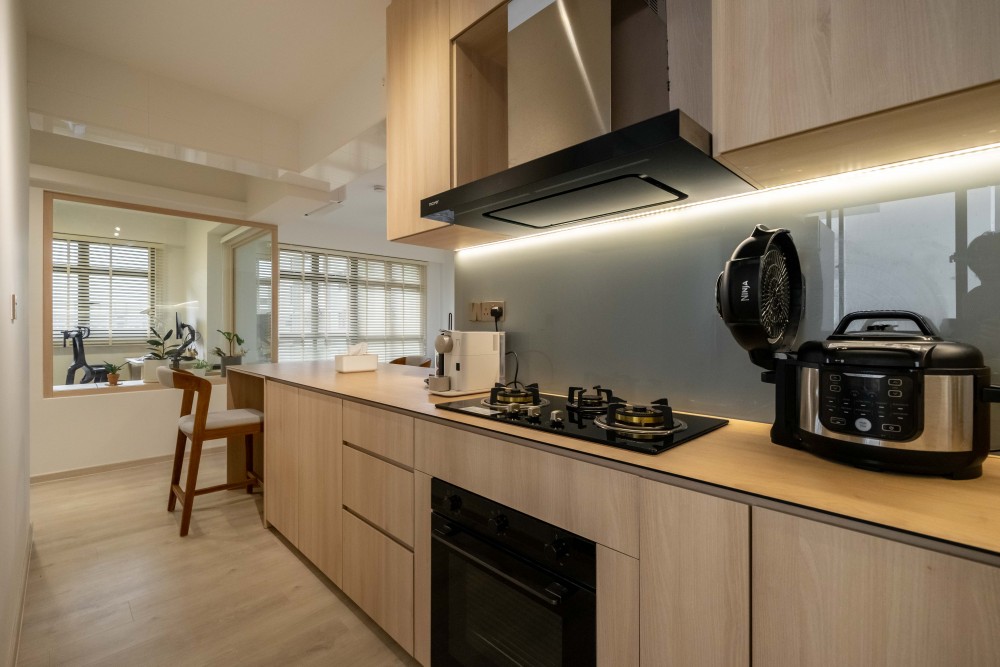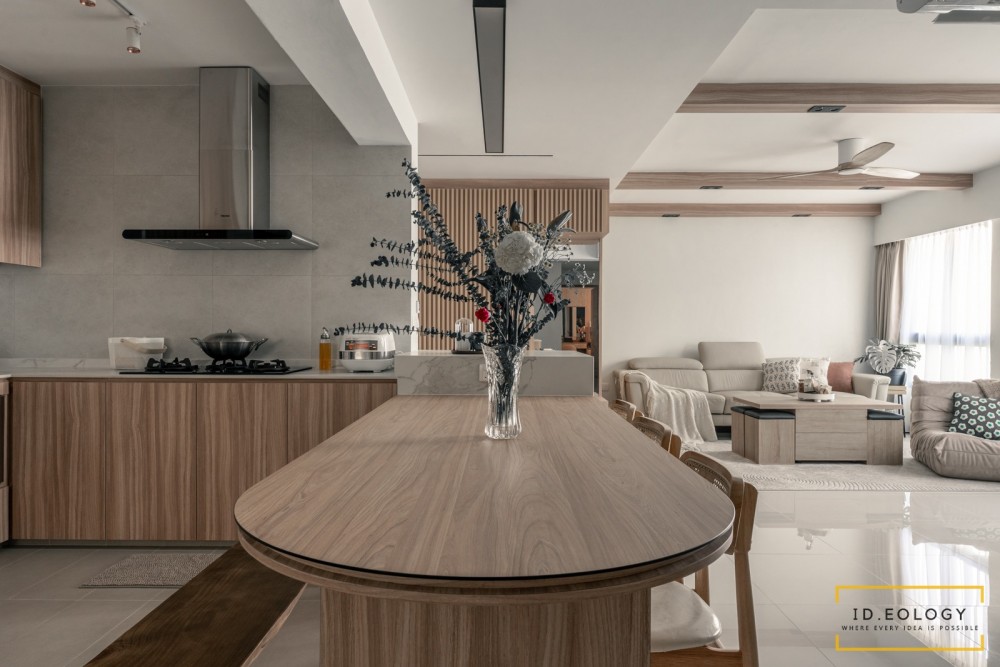What To Keep In Mind When Working With An ID For The First Time
Renovating and working with an ID for the first time?
Here’s what you need to know – your ID can make or break your renovation experience, and choosing the right ID is crucial.
In this article, we discuss all you need to know about working with an ID, including…
- What your ID is meant to do for you
- Qualities to prioritize in an ID
- Red flags to watch out for when choosing an ID
- How to go about searching for an ID
Ready? Let’s jump right in!
Why Work With An ID?
First things first… why work with an ID? Why not just get a contractor to help you renovate your home?


IDs do two things that contractors don’t do – firstly, they design your home; secondly, they take care of project management.
What if you’re coming in with a fully-fleshed out Pinterest board for reference, and you know exactly what you want to do? That’s perfectly fine – in this scenario, your ID’s job will be to look at your proposed design and let you know whether it’s feasible and/or point out anything that you might have overlooked.
Depending on what you’re going for (for example, say you want to create a home that’s conducive for entertaining), your ID may also suggest alternative ways of achieving this.
Design aside, your ID should also help you manage your home renovation project, make sure that things are on track, and provide you with updates as to how your renovation is going.
Qualities To Prioritize In An ID
Now that you know what an ID is meant to do for you, let’s discuss the qualities that you should prioritize in an ID.
Here’s a quick TLDR of what to prioritize:
- Responsiveness
- Punctuality
- Paying attention to your needs and wants
First and foremost, your ID should be responsive. Yes, IDs are commonly juggling multiple projects and may have to field many text messages or customer enquiries in a single day; however, it’s up to them to manage their schedule in a way that allows them to reply to their clients in a timely manner.


Take note of how responsive the ID you’re talking to is, especially when you’re at the stage of researching IDs, and you haven’t committed to a single one yet.
If the ID you’re considering doesn’t reply to your text messages when you’re a prospect (ie: someone that is a potential customer), this either means that they can’t be bothered, or that they have so many ongoing projects that they can’t even set aside 2 minutes to type in a reply to you.
Either way, this doesn’t bode well for your (potential) working relationship with them – once they’ve “closed” you as a customer and you’ve paid your deposit, they’ll have even less of an incentive to reply you quickly.
On top of being responsive, also consider whether your ID is punctual. For instance, if they say they’ll send you a proposal by a certain date, do they really send it to you by that date, or do they take 2 more weeks to get back to you?


You’d be surprised – although this reeks of unprofessionalism, it’s not uncommon to have IDs delay their deadlines by weeks. In the worst scenarios, the ID might not even drop you a text to inform you that they can’t submit the proposal by the pre-arranged date, and needs an extension – they might just go radio silent, until the point when they have the proposal done.
Of course, we’re not saying that the ID in this situation is being negligent or flippant. It could very well be the case that the ID is trying their best, but simply has too much on their plate and can’t deliver on time.
However, this doesn’t bode well for the future – and you’re better off shortlisting an ID who is punctual and meets their deadlines.
Next, another quality to prioritize in an ID is whether they pay attention to your needs and wants. A good ID seeks to understand you and your lifestyle – this will give them a good foundation to design a home that’s truly suited to your needs.
For example, if you’ve expressed a specific need or want (it could be anything as specific as: “I would like terrazzo tiles in the bathroom” or anything as general as “I prefer a maximalist approach to interior design”) and your ID references that in their design, that’s a good sign.
Red flags to watch out for when choosing an ID
On the flip side, let’s discuss a few red flags to watch out for when choosing an ID.
Here’s a quick TLDR of all the red flags:
- If an ID agrees to whatever you say with zero hesitation
- If an ID doesn’t invite you to their showroom
- If your ID is not open to feedback
- If your ID is pushy/tries to get you to commit immediately
- If your ID asks for a big deposit
Firstly, if an ID agrees to whatever you say with zero hesitation, that’s a red flag.


Here’s the thing – Singaporeans are quite the thrifty bunch. When it comes to renovations, most of us have a long list of things that we’d like to do on a not-so-big budget.
As such, when you go through the initial stage of talking to IDs and sharing your vision with them, it’s common to encounter pushback.
For instance, your ID might tell you that for the budget that you’ve got in mind, they can only do A, B and C – not D. Alternatively, your ID might tell you that they can do everything you want, but in order to stick to the budget, you’ll need to compromise by choosing cheaper tiles and flooring.
It’s extremely rare for IDs to say that they can give you everything that you want, without sharing any caveats or suggesting any alternatives.
If this happens, how do you tell whether your ID is trying to scam you, or whether you’re really in that one-in-a-million situation where all your asks are feasible given the budget you have?
Simple – compare your responses across different IDs.
If you encounter little to no pushback from all the IDs that you talk to, that’s awesome – it might be the real deal.
But if you do get many IDs telling you that you need to give up a few things to keep within your budget, and just one ID saying yes to everything you want, then that’s a huge red flag.
Next, if an ID only wants to meet at Starbucks or at your home, and doesn’t invite you to their showroom, that’s a red flag.
Sure, the initial meeting that you have with an ID can be at a coffeeshop. But at some point in time, most IDs typically ask you to make a trip to their showroom, where they can show you all their samples.
If an ID seems hesitant to invite you to their showroom, and insists on meeting outside, in the best case scenario, it could mean that they’re not as established as they’re trying to come across. In the worst case scenario, it might be a scam.
On top of that, also keep a lookout for whether your ID is open to your feedback, or whether they’re constantly trying to push for what they like.


Your ID will give you their professional opinion and share suggestions on what you can do with your home – that’s their job.
However, at the end of the day, it’s your decision to make. If you feel that the ID’s suggestions or proposed design doesn’t make sense for you and your lifestyle, then it’s perfectly fine for you to veto it, and to advocate for what you want.
If your ID seems pushy and/or isn’t receptive to your feedback, this means they’re probably not a good fit for you.
Next, if your ID tries to get you to commit before you’re ready, this is a red flag as well.
It’s common for homeowners to talk to a few IDs and consider different proposals before settling with the ID whom they feel is the right fit – so don’t let anyone rush the process for you.
With ID scams, it’s common for the ID to try and entice customers into committing immediately by offering huge discounts that are (conveniently) ending within 24 hours or so.
Again, this brings us back to the first red flag – if the ID says they can do whatever you want and the price sounds too good to be true, it probably is too good to be true.
Last but not least, if your ID asks for a huge deposit, this should raise alarm bells.
Generally speaking, ID firms will ask for 15%-20% in deposit. (In comparison, we hear that customers who get scammed sometimes pay as much as 50% upfront).
Also, your subsequent payments should not be made based on a fixed timing or schedule; rather, these are paid upon completion of key renovation milestones.
For instance, a legit contract may state that you’ll pay 20% upfront, then an extra 10% once hacking is complete, an extra 10% once tiling is complete, and so on.
On the flip side, a scam contract might state that you’ll pay 50% upfront, then 20% more after 2 months of work has commenced, and an extra 30% once 6 months of work has commenced.
How To Go About Searching For An ID
Now that you know what qualities to prioritize in an ID, and what red flags you should look out for, let’s talk about how to go about searching for an ID.
Here’s a quick TLDR:
- Start the search as early as possible
- Make use of online platforms
- Ask your friends & family
- Read reviews & Google them extensively
- Conduct an on-site review if necessary
- Make sure quotations are as specific as possible
- Ask about hidden costs
- Discuss updates and project management
- Discuss warranties
Firstly, start the search as early as possible. Most folks meet anywhere from 2-5 IDs before settling on an ID of their choice, and you’ll need to buffer additional time for each ID to submit quotations.


By starting your search early, you’ll be giving yourself more breathing space, and making the process less stressful.
Next, make use of online platforms such as Hometrust. There’s no need to painstakingly search for and compile a list of IDs on your own – you can shortlist IDs from these platforms and view their portfolios before deciding who you want to meet.
On Hometrust, for example, you can shortlist IDs by:
- Their ratings
- Their awards (Best design, Best workmanship, Best customer service, Best value)
- Whether they currently have any promotions available
- What type of property they specialize in (3-5 room HDB flats, executive HDB flats, condominiums, etc)
- What style they specialize in (Contemporary, eclectic, industrial, minimalist, modern, etc)
You can even see which year each of the ID companies were established in – this gives you the assurance that you’re working with a legit company, with experienced designers who know what they’re talking about.
Plus: Once you submit an enquiry on Hometrust, the ID that you’ve reached out to will get back to you within 24 hours. How’s that for responsiveness? 😉
Once you’ve checked out the online platforms, you’ll also want to ask your friends and family for recommendations for IDs.
You might not get a ton of recommendations from this source, but chances are, the recommendations that you do get will be pretty high quality.
Make sure you cover all your bases, and ask your friends whether they’re happy with their ID’s service, whether there were any challenges that they faced, whether their home turned out the way they wanted, etc.
Now that you have a bunch of IDs you’ve shortlisted, go ahead and schedule appointments with them, and read reviews online.


You can check out their reviews on the platforms where they’re listed (eg Hometrust), and also check if they have any reviews on Google. When looking at reviews, also pay attention to which designer’s names are mentioned.
For example, say all the positive reviews you’ve read from Company ABC mention Designer X. In this case, you’ll want to make sure you work with Designer X specifically – you might not get a similarly positive experience if the company assigns a newer, less experienced designer to take on your account.
On top of that, if you want to be extra careful, do a quick Google search for the company name + “scam”, and see if any relevant results appear.
It’s important to do your due diligence here, so you can make sure that the companies that you’re talking to are all legit.
Once you’re in the process of speaking to your IDs, think about whether an on-site review (at your home) is necessary.
Generally speaking, IDs don’t conduct on-site reviews for new flats (eg new BTO units). This is because most BTOs are roughly the same, and it’s relatively easy for your ID to propose a design based on the floorplan (and, of course, the look and feel that you want to achieve).
However, if you’re planning on renovating a resale unit, especially one that’s old – an on-site review is definitely recommended.
Why is this the case? During the on-site review, your ID will be able to assess the property more accurately and also look out for any potential issues that they’ll need to address during the renovations. This includes issues such as sagging doors, water damage, mould, etc.
Yes, it’s annoying when unforeseen issues suddenly arise and your renovation costs end up ballooning – but it’s important to fix these things rather than let them fester.
As such, on-site reviews are an absolute must-have for resale properties.
After on-site reviews, you’ll probably start receiving quotations from the IDs you’re in contact with. Here, make sure the quotations are as specific as possible – your IDs should break down every single line item so that you know the cost of each, rather than bundling them up and just telling you the lump sum at the end.


For instance, if they quote you $60k in entirety, you should be able to see how much of the $60k goes to hacking, how much goes to tiling, and how much goes to cabinetry.
For cabinetry, all the details (such as the material to be used, the type of finish, and even the brand of hinges) should be included, as there may be a significant difference in the cost depending on which type of materials you go for.
The more specific the quotation is, the more visibility you’ll have into your project – and this is crucial factor in managing the entire renovation, and keeping costs low.
For example, if you realise that tiling takes up a huge portion of your budget, you might decide to replace the original European tiles you chose with cheaper tiles that are available locally.
Alternatively, you might choose to omit certain items altogether (for example, doing without a built-in TV console) in order to keep costs manageable.
On the topic of specificity, be sure to discuss additional tasks and hidden costs with your ID as well.
Hidden costs include:
- Post-renovation clean up
- Painting works
- Cement screeding (for those who have a new flat that comes without tiles/flooring)
- Electrical works
- Installation fees for toilet fixtures, light fixtures, etc
Hidden costs aside, it’s also important to talk about warranties before you sign off on a quotation.
Look for the term “defects liability period” in the quotation – this is essentially your warranty period, and beyond this period of time, your ID won’t be responsible for any repair costs that arise from defective items or poor workmanship.
As a general rule of thumb, warranties last for 6 – 12 months. Some of the more affordable companies might omit the warranty altogether, but buyer beware – this obviously gives you less peace of mind compared to if you have a 12 month warranty.
Last but not least, you’ll want to talk about project management and the frequency of updates, before you seal the deal.
Generally speaking, IDs will update you every week or every fortnight, and send over pictures of your home’s renovation progress.
However, don’t take this for granted – do confirm this with your ID, in order to ensure that you’re on the same page.
A Final Word On Working With An ID For The First Time
If we could boil down this entire article into two pieces of advice, it would be this:
- Make sure you choose an ID who has a good work ethic
- Make sure you choose an ID who’s legit, and isn’t trying to scam you
Here’s a quick checklist to recap what we discussed:
- Look for an ID who’s responsive, punctuality, and pays attention to your needs
- Red flags include IDs who agree to whatever you say with zero hesitation, IDs who don’t invite you to their showroom, IDs who are not open to feedback, IDs who are pushy and try to get you to commit immediately, IDs who ask for an unusually large deposit
- When searching for an ID, start the search as early as possible. Make use of online platforms, and ask your friends & family.
- Read reviews & Google your potential IDs extensively, and get them to conduct an on-site review if you’re renovating a resale flat or condo.
- When evaluating quotations, make sure they are as specific as possible, and ask about hidden costs and warranties
- Discuss project management and updates with the ID to ensure you’re on the same page
Congrats! Now that you’ve made it all the way to the end of this article, you’re an expert on working with IDs 😉
Time to kick-start your search with Hometrust, by clicking on the link below!
Want to check out home renovation projects for more inspiration? Browse home design ideas on Hometrust, or click the button below to get connected with expert designers.
Renovating soon? Let Hometrust recommend the best interior designers.
If you are reading this, you are probably wondering how you can create your dream home.
Here’s the thing, everyone’s needs and requirements for their home renovation is different. A designer that may work for someone else, may not quite work for you.
At Hometrust, we’re here to help match top rated designers, recommended by past homeowners to you through our data-driven and matching algorithm.
Whether you are looking for partial renovation or a full fledge overhaul, we’ll be able to recommend you top designers to match your renovation requirements and lifestyle.
Recommendations and free and you can simply start by helping us understand your needs below!
Get RecommendationsRenovate safe!
The Hometrust Team




